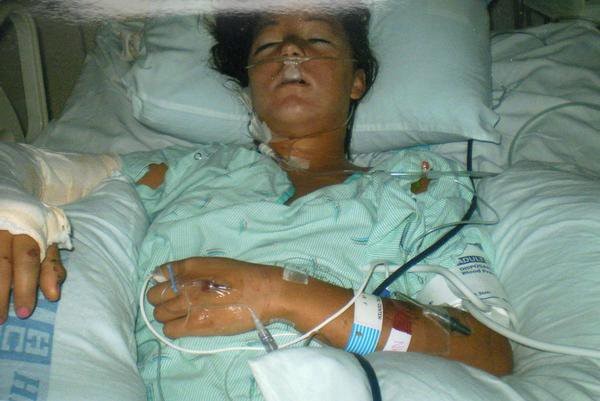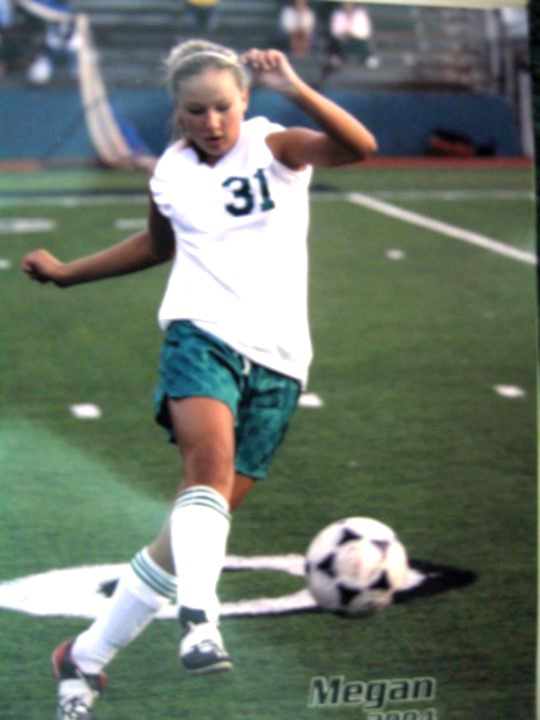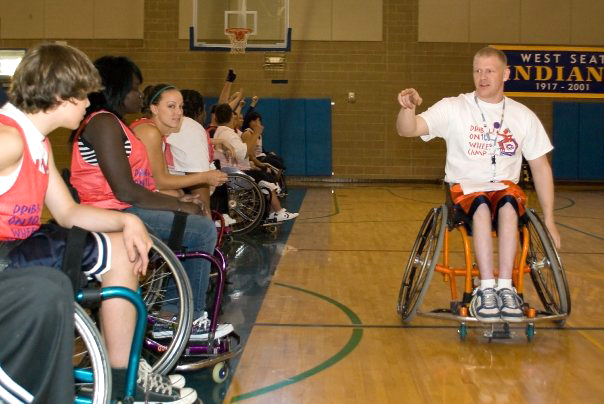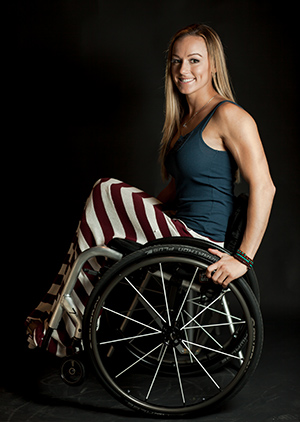It has been 10 years since I was in that motorcycle accident that left me paralyzed from the waist down. I was 18 when that happened, and I had no idea what the future held. But if you were to ask me back then if I thought I would be where I am today: graduated with a Master's degree in social work and about to start working towards my dream job of becoming an Assistive Technology Professional, along with having won a Gold Medal in the Paralympics...I would have said yes. Being the best that I can be, whatever it is that I do, is the driving force inside of me. This desire, combined with faith and grit are the three things I would say have gotten me to where I am today.

I was the passenger in the motorcycle accident that changed the direction of my life. The driver lost control of the motorcycle and we slid off the road into a cement wall barrier. I was ejected from the bike. My body first hit a street sign, my helmet flew off and I then went over a 15-foot cement wall and dropped 30 feet down a steep incline, hitting multiple trees and bushes on the way down. My friend, who was in the truck behind us, found me minutes later with my legs spread apart and my face down in the dirt between them. I wasn't breathing when she found me. I had broken my back and 18 other bones, one of my lungs collapsed, and I was paralyzed from the waist down. I told her that I couldn't breathe and asked her to put me on my back. I then tried to move my legs and started saying over and over again that I was paralyzed. I didn't realize then how much my faith would be tested and how important grit and self-determination would be.
Before my accident, I was an athlete. There wasn't a single sport that I wouldn't try or any sport that I didn't quickly take to. I was extremely blessed, athletically. I could have gone as far as I wanted to in almost any sport that I played. Despite the opportunities that I had all around me, I struggled to believe in myself. I always knew I was better than what I was allowing myself to be, and I hated myself for letting my own thoughts put me down the way that they did. It was a battle only those who have experienced depression can understand.

When I was younger, my idol was Mia Hamm. I remember reading about how she trained every morning before the sun even came up. She trained when no one was looking. I re-read those pages of her book over and over again and told everyone I could about her and the things that she did. Every time I talked about her I would light up inside. I wanted to be her. I wanted to do what she did. Then, laying there in my hospital bed, no longer able to move my legs, I was filled with a horrible regret for all of the opportunities I had taken for granted.
As the reality of it all continued to set in slowly over time, I did the only thing that I could do: I got up every morning and I did my best to get through each day just hoping that sooner than later I would find what I needed to live again. I told myself that no matter what, things would get better one way or another. I saw no light at the end of the tunnel, but I kept getting up every day. I went to the gym, I went to school, and I cried myself to sleep every single night. And then, one year later, I learned about wheelchair basketball. I knew this was my second chance and I wasn't about to take it for granted.
A basketball wheelchair can cost anywhere from $3,000 to $7,000 and I didn't have that kind of money. So I worked with what I had. I played in my everyday wheelchair for the first month or so, which completely sucked (if you're able-bodied, think of it like playing in flip-flops, but about 100 times worse). Right about the time I wanted to give up, I was given a basketball wheelchair to borrow. It was too big for me, but it was 100 times better to play in than my everyday wheelchair was, and it gave me hope and just the motivation I need to keep pushing forward. Later I was told about an amazing organization called The Challenged Athletes Foundation that might be able to help me purchase a basketball wheelchair. I applied, and six months later I was given my first basketball wheelchair.

Next I went to a wheelchair basketball camp that was being run by the coach of the University of Illinois women's wheelchair basketball team. At this camp, not only did I get to meet elite-level athletes, but my eyes were also opened to the possibilities that were out there: colleges that had wheelchair basketball teams and the possibility of earning a wheelchair basketball scholarship. This was unreal to me. How had I gone my entire life never once even hearing about the sport of wheelchair basketball, let alone all of these amazing opportunities that were out there for people with disabilities?
I was suddenly able to see the light at the end of the tunnel and I knew that it was possible to reach it. There was no question in my mind that I was going to do whatever it took to make it to the Paralympics. I knew that meant moving across the country and playing wheelchair basketball for a college team in order to get the coaching, the teammates, and the competition that I needed if I wanted any real chance.
So I went back home and I got to work. I spent hours and hours at the gym. I was there almost every night until it closed, lifting weights and playing wheelchair basketball by myself. I also found out exactly what I needed to do to get into one of the colleges that had a wheelchair basketball team. I re-enrolled in community college to take the last few classes I needed to transfer and I began applying to all of them and playing as much wheelchair basketball as possible.
Read Part 2 of My Road to Rio 2016
About the Author

Paralympic Gold Medalist Megan Blunk currently lives in Gig Harbor, Washington. Shortly after high school graduation, she was partially paralyzed in a motorcycle accident. Megan received a scholarship to play wheelchair basketball at the University of Illinois at Urbana-Champaign where she earned her bachelor's degree in Psychology and will soon complete her master's degree in Social Work. She has a passion to help kids and adults who are struggling with their own challenges.
Since her accident, Megan has competed in kayak and canoe racing, winning two silver medals for the USA at the 2013 International Canoe Federation Paracanoe Sprint World Championships in Moscow, Russia finishing fourth in her two events. In 2015 she won a gold medal with Team USA women's wheelchair basketball team at the Parapan Am Games in Toronto.
Becoming a member of Team USA for the 2016 Rio Paralympics has been a goal of Megan's for the past several years and winning the gold medal was certainly the ultimate reward for her hard work and determination. Megan's character, integrity, and compassion make her the best ambassador the United States could ask for.
Megan's ride is a Quickie 7R. Her sport chair is a Quickie All Court.
Most of the stories here on LiveQuickie.com were submitted by readers. Do you have a story to tell? We'd love to hear it. Submit your story here.